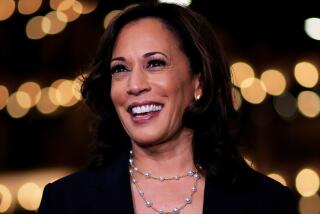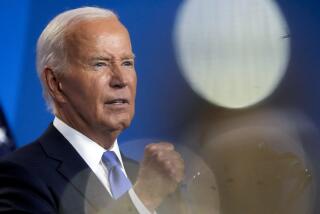It’s Super
Super Tuesday could turn out to be a super success, a super bore or just plain super confusing. Pay the money and take a choice. Democrats originally thought up the 14-state regional primary, but if there is a dramatic effect this Tuesday it could well come on the Republican side. That would happen if Vice President George Bush won by such a massive margin that he would all but eliminate Kansas’ Sen. Bob Dole from the contest.
Conservative and moderate Democrats originated Super Tuesday with the goal of stealing attention and importance from Iowa and New Hampshire and recapturing the party from the liberal reformers of the past 20 years. Super Tuesday was to have made it possible for a conservative-to-moderate Democrat like Sen. Sam Nunn of Georgia to walk away with a giant victory and thus be propelled to almost certain nomination at the Democratic National Convention this July in, appropriately, Atlanta.
One problem was that Nunn and other prominent Southerners decided not to run after all. That fact may demonstrate that the structure of the political-primary system is not as important as the makeup of the field of candidates--including their number, their philosophies and their styles. The original design of Super Tuesday probably would have worked only if the Democratic field had been narrowed by now to one liberal and one conservative-moderate.
There is irony in the fact that Super Tuesday was supposed to diminish the effect of the Iowa and New Hampshire events. But Rep. Richard Gephardt of Missouri would not be the major candidate that he is now if he had not concentrated so much time and energy on winning Iowa, which received unprecedented attention this year. Sen. Albert Gore of Tennessee gambled by virtually ignoring Iowa and New Hampshire and focusing on his home turf in the South. But Gore’s candidacy probably will be dead unless he does better than the pre-primary polls indicate.
Dramatic breakthroughs will be difficult for Democrats, however, since national convention delegates are awarded on a congressional district basis in proportion to the candidate’s vote in each district. One candidate could lose the popular vote statewide and still win more delegates than his opponents. A further irony of Super Tuesday is that two Democratic liberals, Massachusetts Gov. Michael Dukakis and Jesse Jackson, could gain the most--Dukakis because he is the most un-Southern of any of the Democrats and Jackson if he is able to draw voters considerably beyond his black base.
More confusion could be caused by the fact that Republicans can vote in the Democratic primary, and Democrats in the Republican balloting, in some states like Texas. In others like Florida, voters must stick with their registered party. The assumption has been that a number of conservative Democrats might vote in Republican primaries because they are not happy with the choice in their own party. But of course it could work the other way, too.
Super Tuesday is more of a high-stakes affair for Republicans because delegates are awarded on a winner-take-all basis, either at the state level or by congressional district. The South is television evangelist Pat Robertson’s base, and he must do better than the polls indicate if he is to remain a force in the contest. If Robertson does not draw his share of the potential Bush vote, the situation will become that much more difficult for Dole.
An early criticism of Super Tuesday was that so many Democratic delegates were at stake that one Democrat almost certainly would have had the nomination wrapped up by the morning of March 9. About the only certainty now is that this will not happen.
More to Read
Get the L.A. Times Politics newsletter
Deeply reported insights into legislation, politics and policy from Sacramento, Washington and beyond. In your inbox three times per week.
You may occasionally receive promotional content from the Los Angeles Times.










